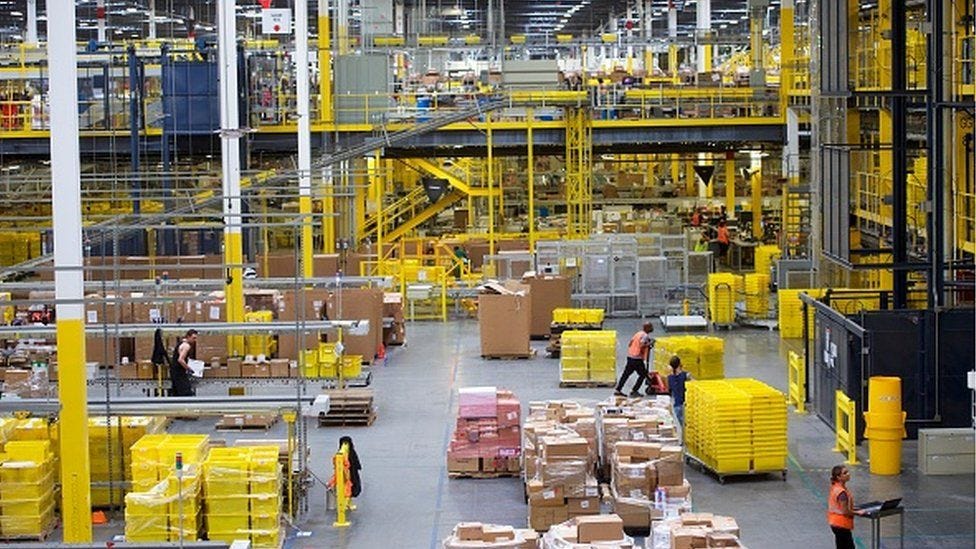Amazon joins the push for marijuana decriminalization
Plus: How to hold businesses accountable for their racial justice commitments and one of the ways I express gratitude to those who make my work and life feel so rich.
👋🏾 Hi, hey, hello!
One of my favorite books as a kid was Chicka Chicka Boom Boom so I was kind of bummed to learn the author Lois Ehlert recently passed away. On a lighter note, if you Spotify is your preferred music-streaming app then you’ll probably enjoy Only You, a new digital experience from the company that gives you shareable personalized playlists like the end-of-year Wrapped music breakdown. Spotify also introduced Blend, which will let you and a friend automatically merge your musical tastes into a playlist. As an Apple Music guy, even I’ve gotta admit those are some pretty legit enhancements.
Keep reading for the rest of today’s top stories:
Amazon joins the push for marijuana decriminalization
Yesterday Amazon published a blog post by Dave Clark, the CEO of its consumer business, announcing that the company would no only test for marijuana for any positions not regulated by the Department of Transportation and would instead treat it the same as alcohol use. A spokesperson did not respond when asked if the policy was effective immediately or if an applicant who was disqualified from employment due to a failed drug test for marijuana could reapply under the updated policy.
Amazon is on the side of public opinion on the issue. An April poll from the Pew Research Center found that six in 10 Americans say either that marijuana should be legal for medical and recreational use. Another 30 percent believe the drug should be legal for medical use only. But there’s still a lot of stigma and inequality around weed and who gets prosecuted for it and gets to profit from it. Hopefully a company with Amazon’s scale and favorability can continue to trend the issue in an equitable direction.
In his blog post, Clark also called on lawmakers to pass the MORE Act and other employers to lend their support to the bill. In yesterday’s newsletter, I reported that House Democrats reintroduced the bill last week, which would decriminalize marijuana at the federal level and allow people with cannabis-related convictions to have their records expunged. And this morning, I spent the morning reaching out to most of the tech companies behind the biggest apps — including Twitter, Snap, Facebook, Google, Apple, LinkedIn, Microsoft, Lyft, Uber and Clubhouse for comment on if it tests employees for marijuana, plans to revisit its drug policies in the near future if so and supports the MORE Act. Each company did not respond to my request by press time.
A spokesperson for Pinterest confirmed that it does not test employees for marijuana and said the company is currently reviewing the legislation. I’ll loop you in if I hear back from any other companies prior to tomorrow’s issue.
In other Amazon news:
The company announced its annual Prime Day will be on June 21 and 22. Prior to last year’s event, I wondered if the shopping event is worth the pressure to perform it creates for its warehouse workers.
Amazon also opened its first Disaster Relief Hub in metro Atlanta, as hurricane season gets underway. The 10,000 cubic-foot facility will stock more than half a million Amazon-donated relief supplies — enough to fill an Amazon Air 767 cargo plan. Related: The National Oceanic and Atmospheric Administration released the list of hurricane names for 2021.
Those stimulus checks understood the assignment
According to new research from Patrick Cooney and H. Luke Shaefer at the University of Michigan via Ben Winck at Business Insider, the stimulus checks from the March 2020 CARES Act, the package passed at the end of last year and the relief bill signed by President Joe Biden in March slashed pandemic-era food shortages and financial worries by nearly 50 percent.
Consider this proof of the fact that getting cash into the hands of people who earn poverty wages and are without a safety net is effective policy.
The next step is to raise taxes on corporations and the wealthy to reinstituionalize the government programs people rely to make ends meet so they’re available even after the pandemic has officially ended.
Biden enlists VP Harris to achieve his voting-rights agenda
During yesterday’s speech to commemorate the Tulsa Race Massacre, President Biden announced Vice President Kamala Harris would manage the administration’s efforts to pass federal voting rights legislation that would repair some of the damage racist voter suppression laws in Georgia, Texas and Florida are wreaking on our democracy.
I reached out to the offices of Sen. Jeff Merkley of Oregon and Rep. John Sarbanes of Maryland, the two sponsors of the Senate and House versions of the For The People Act — which would expand voter registration and voting access, limit the removal of voters from voter rolls and require states to establish independent redistricting commissions to carry out congressional redistricting — for their reaction to the news but did not receive a response by press time.
“The work ahead of us is to make voting accessible to all American voters, and to make sure every vote is counted through a free, fair, and transparent process,” Vice President Harris said in a statement from the White House. “This is the work of democracy.” It’ll be a tall order for Madame Vice President, even with her previous experience in the Senate before her current gig as VP. But it’s worth trying anyway.
In other White House news:
President Biden and Vice President Harris’s full staff will return in person in July. Another signal that this summer is the beginning of a long-anticipated new normal.
In a response to critics who question why he hasn’t been able to get a wide-reaching voting rights bill passed, President Biden called out Democratic Sens. Joe Manchin of West Virginia and Kyrsten Sinema of Arizona — without invoking their names — for their opposition to filibuster reform and their unwillingness to fully embrace his agenda. Spokespeople for Manchin and Sinema didn’t respond to a request for comment on the president’s callout.
NAACP President to Biden: You missed an opportunity on student debt forgiveness in Tulsa
After President Biden announced a series of new initiatives to narrow the racial wealth gap and build Black wealth, NAACP President Derrick Johnson critiqued the president for excluding student debt forgiveness from the actions. “Student loan debt continues to suppress the economic prosperity of Black Americans across the nation,” Johnson said in a statement. “You cannot begin to address the racial wealth gap without addressing the student loan debt crisis. You just can’t address one without the other. Plain and simple.”
President Biden isn’t the only one with a blind spot when it comes to the intersectionality of student loan debt and the challenges Black Americans face in generating and passing down wealth or starting and sustaining small businesses.
But he seems to be dug in on his position that forgiving the trillion dollars of debt held by millions of Americans is outside of his executive authority. When asked during her daily briefing why the president’s budget doesn’t include $10,000 in student debt forgiveness, Press Secretary Jen Psaki replied: “He’d be happy to sign the bill into law if [Congress] passed that bill.” Deep sigh.
HBR: Businesses should be held accountable for their racial justice commitments from last year
We’re about a year from the wave of promises from corporations during last summer’s uprising against white supremacy and racist police violence. And Laura Morgan Roberts and Megan Grayson at Harvard Business Review want companies to “hold themselves accountable for action so they don’t simply maintain historical structures and cultures of racism.” They outline five recommendations for “ensuring that leaders are true to their word in leading change, not simply engaging in performative allyship”:
Make racial representation levels transparent.
Share goals and track progress publicly.
Incentivize leaders to practice inclusive leadership.
Issue penalties for not meeting diversity goals.
Use specific language.
The article also outlines why we fail to hold leaders accountable for diversity goals. Accountability slips through the cracks when people don’t believe there’s a problem, they don’t believe the problem is business’s to solve, they want to avoid conflict, the dominant group feels threatened and favoritism is hard to prove.
But that’s no excuse to let these businesses off the hook. From a conversation with Callia Hargrove, strategist and founder of Backstory Consulting: “To make long-lasting change, brand leaders really need to invest. Invest in learning their organization’s blind spots and fixing them. Invest in learning about all of the different types of diversity. Invest in creating a staff that reflects what the world really looks like. Invest in doing the personal work to be anti-racist, and making sure that your work environment is safe for everyone. If every company leader did that with honesty and integrity, I truly believe the world would be a much better place.”
Read All About It
Alex Abad-Santos at Vox on LGBTQ+ Pride:
Instead of broadening mainstream culture to accommodate the humanity of the LGBTQ community as a whole, respectability politics asks a community to change itself for mainstream sympathy. It’s not hard to see why many LGBTQ people, regardless of kink tastes, take issue with installing exclusion or policing behavior at Pride celebrations. Queerness, at its core, is a rejection of that respectability.
Tyler R. Tynes at GQ on Naomi Osaka:
The issue is not Osaka, or her statements, or her refusal to speak with the same boring, majority white press she’s interacted with since her emergence in the sport. The issue lies with who has the power to continue to shape the game and punish those who do not fit their idea of what it means to be a superstar. The central contradiction in sports is the idea of it as some mighty force for unity, when it has always been a false idol to the players who want their game to change. It’s easy to wax lyrical about the triumph of the unyielding human spirit until athletes begin acting like more than lifeless apparitions.
McKay Coppins at The Atlantic on Joe Biden and the conservative book bust:
His presidency may be young, but industry insiders have told me in recent weeks that the market for anti-Biden books is ice cold. Authors have little interest in writing them, editors have little interest in publishing them, and—though the hypothesis has yet to be tested—it’s widely assumed that readers would have little interest in buying them. In many ways, the dynamic represents a microcosm of the current political moment: Facing a new president whose relative dullness is his superpower, the American right has gone hunting for richer targets to elevate.
James Surowiecki at MSNBC on Elizabeth Holmes, Bill Gates and Steve Jobs:
How did she get away with it for so long? In part, it’s because Holmes defined Theranos not as a health care company but as a technology company. And making promises that you’re not sure you can deliver on is something technology companies do all the time. Indeed, the history of Silicon Valley, and of the tech industry generally, is littered with companies that promised fantastic new products and features that they ended up delivering years late — or, in some famous cases, never delivered at all. It’s such a common phenomenon, in fact, that there’s even a phrase for it: “vaporware.” And the most famous tech executives in history, like Bill Gates and Steve Jobs (upon whom Holmes modeled herself), were adept practitioners of it.
Kristen Hawley at Eater on food delivery apps:
And while these recent changes are designed with the smaller, independent restaurant owners in mind, the companies behind the big apps pride themselves on their size — and that’s where a lot of investment is going. While any given delivery app could work just fine for a small and local business, signing up large companies at scale can really move the needle on growth. (It was a big deal in the business press when McDonald’s ended its Uber Eats exclusivity in 2019 to work with DoorDash.) On a recent earnings call, Uber CEO Dara Khosrowshahi touted the over 700,000 restaurants using Uber Eats around the world, and he doesn’t seem to think the company will have trouble signing on more. “We expect to grow our restaurant supply base really for the next five years, at least,” he said. DoorDash wouldn’t share specifics of how many restaurants were converting to the new lower-fee options, but said restaurants are signing on to all of the new pricing packages. For those small mom-and-pop restaurants, standing out on an app with tens of thousands of restaurants requires an investment — if not in money, then definitely in time.
Olivia Harrison at Refinery29 on Saweetie:
Just like she did with her high school powderpuff team, Saweetie has approached her career with her eye on the prize, working hard never to be counted out, knowing that she will always make the cut. "I'm consistent with music, I'm consistent with content, I'm consistent with my brand, and I think consistency just always wins," she says. Even when she does something unexpected — from showing off wacky food combinations, like Top Ramen seasoning sprinkled on oysters, or, yes, ranch dressing squirted all over spaghetti, to keeping a full-length mirror in the back of my car so she can pose for the perfect selfie anywhere — there's never any doubt that she knows what she's doing, it's just up to the rest of us to follow her lead. So, we'd better be paying attention, because class is in session. "I'm going to continue working hard, I'm going to continue building out my team, and I'm excited to see what the future holds," she says. One of those things she's working toward is teaching a course one day at USC. What will the subject be? Social media, of course. Sign me up.
Michael’s Pick
Paper Source Thank You Script on Kraft Stationery Set ($18 for a set of 10): I keep a box of thank you cards at the ready for expressions of gratitude to those who make my work and life feel so rich.




